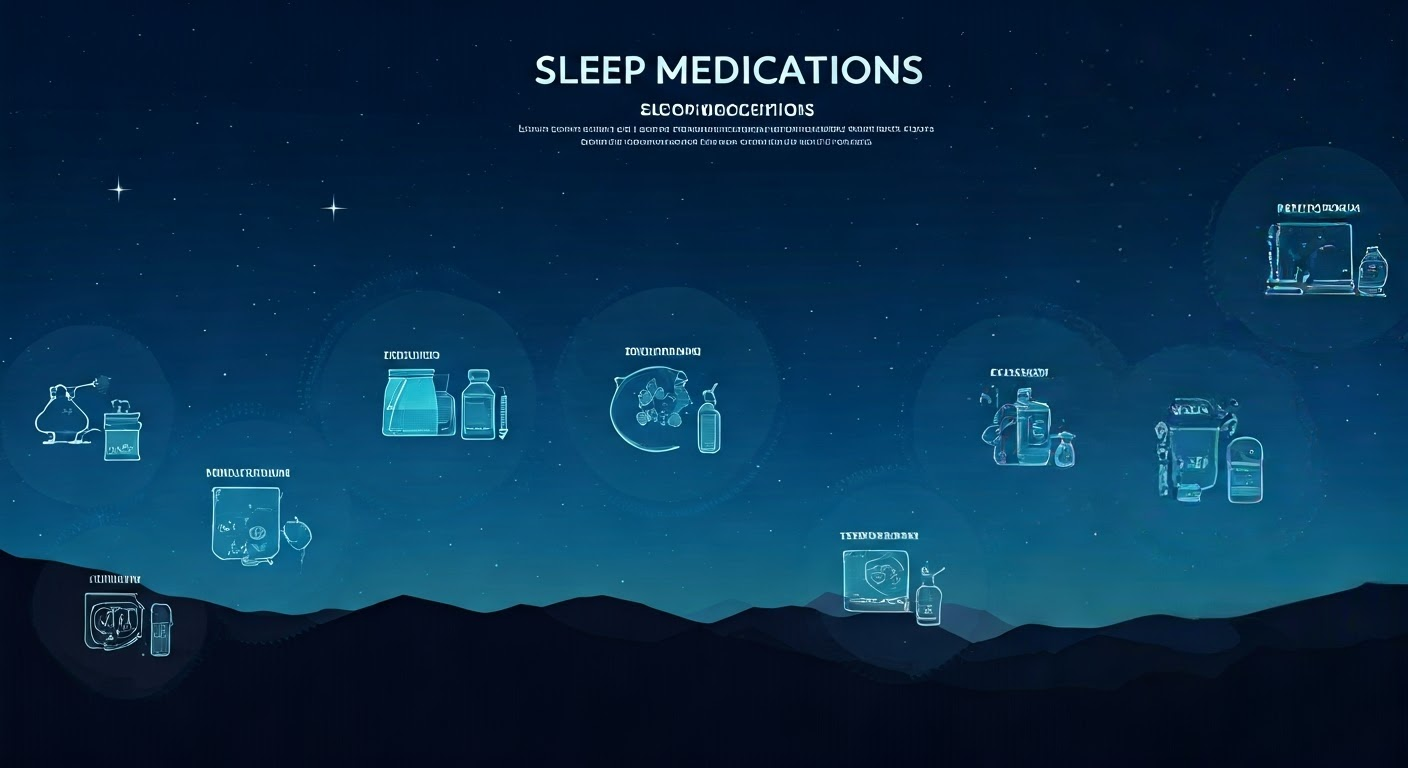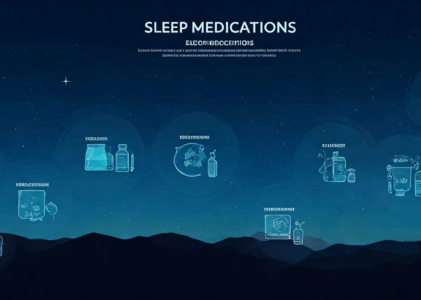The Ultimate Guide to the Best Drug for Better Sleep
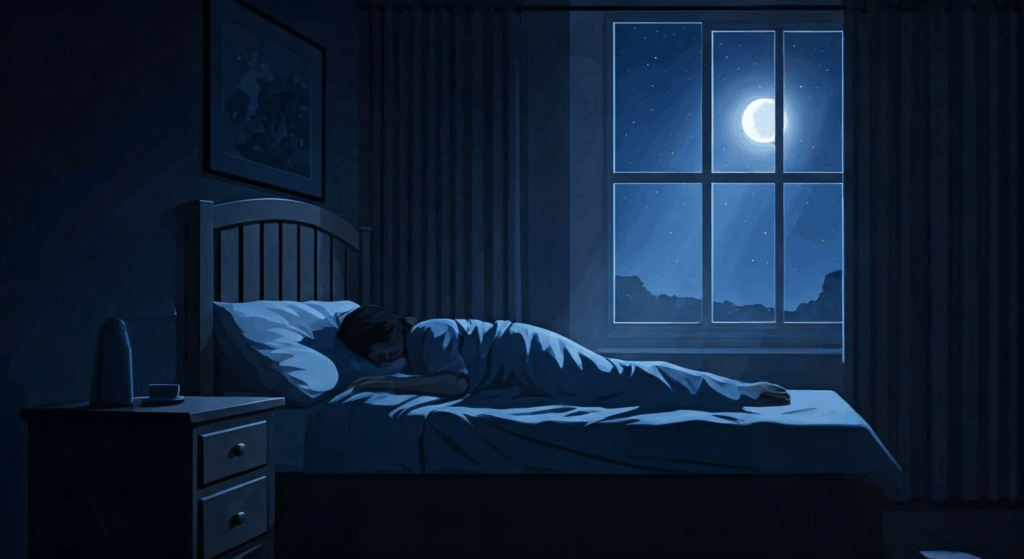
Key Highlights
- Insomnia affects up to 40% of U.S. adults, making sleep medicine a vital tool for improving sleep quality and addressing sleep disorders.
- Prescription sleep aids like Ambien CR and Lunesta are effective for sleep onset and maintenance insomnia but come with potential side effects.
- Natural supplements like melatonin help regulate circadian rhythms and are a popular choice for relieving jet lag.
- Controlled substances, including benzodiazepines and orexin receptor antagonists, are used for short-term insomnia treatment under healthcare supervision.
- Cognitive behavioural therapy and lifestyle changes remain the most recommended methods for chronic insomnia management.
Introduction
Are you having trouble sleeping due to chronic insomnia or broken sleep patterns? Sleep medicine can help you get better sleep and may be given for the treatment of insomnia. There are different options available, such as natural supplements, prescription drugs, and over-the-counter aids. Sleep medications can provide temporary relief but they can also lead to dependency risks and possible side effects. If your insomnia continues, it’s important to look into other solutions like cognitive behavioral therapy and good sleep habits.
Top 10 Drugs for Better Sleep
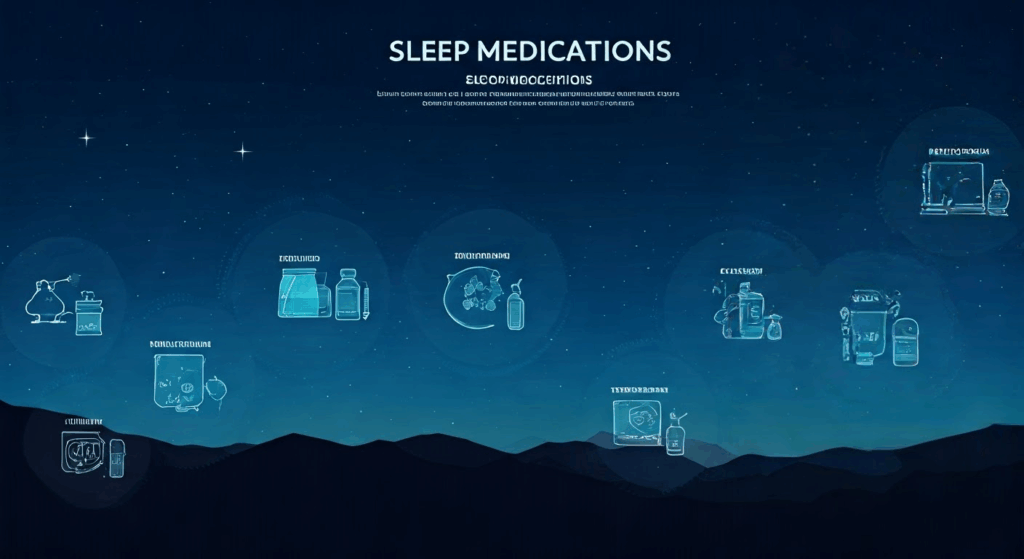
These medications include benzodiazepine receptor agonists and melatonin receptor agonists. They work best for short times. Although they are helpful, using them can lead to withdrawal symptoms and other adverse effects. This means it is important to monitor their use carefully to ensure safe treatment.
Melatonin: Natural Hormone Supplement
Melatonin supplements are often chosen because they act like the hormone that helps regulate our sleep cycles. This hormone is made by the pineal gland. Melatonin helps manage sleep-wake cycles, especially during things like jet lag. The supplements help the body adjust to new time zones or changes in sleep patterns.
When used as a sleep aid, melatonin usually causes fewer serious side effects than prescription drugs do. Still, taking them in a way that is not consistent, since these products are not regulated by the FDA, can lead to unwanted effects like grogginess or headaches. It’s important to talk to healthcare professionals to find the right dosage.
Clinical studies show mixed results about how well melatonin works. It may help people fall asleep faster in the short term, but it’s unclear if it helps with chronic insomnia. For the best results, melatonin should be combined with good lifestyle changes, like keeping sleep hygiene, to increase its benefits.
Zolpidem (Ambien): Popular Sleep Aid
Zolpidem, known as Ambien, is well-known for helping people sleep. It is a popular choice in sleep medicine and is mainly used for the treatment of insomnia. This sedative helps with sleep onset for those with chronic insomnia or sleep disorders. It can improve sleep quality. However, it is important to be aware of potential side effects, such as daytime sleepiness and trouble thinking. Healthcare professionals stress the importance of proper drug administration. They also encourage good sleep habits to gain the most benefits and reduce the risks that come with this controlled substance.
Eszopiclone (Lunesta): Effective for Insomnia
Eszopiclone, which is sold as Lunesta, helps treat insomnia. It is a non-benzodiazepine sleep aid. This means it can help you fall asleep and stay asleep well, no matter your sleep habits. However, using it regularly could cause side effects like daytime sleepiness or dizziness. It’s important to talk to healthcare professionals about this. Taking the drug correctly, using cognitive behavioral therapy, and keeping good sleep hygiene can all make it work better. This approach can help manage chronic insomnia and improve the quality of your sleep.
Ramelteon (Rozerem): Mimics Melatonin
Ramelteon, also known as Rozerem, is a good choice for people who have trouble falling asleep. This sleep medication works like melatonin, which is important for managing our sleep patterns. It is a melatonin receptor agonist, which means it helps you sleep without the sedative effects often found in other prescription drugs. This special way it works makes it a better option for those who worry about the common side effects of regular sleep aids. These side effects can include excessive daytime sleepiness or problems when stopping the medication.
Doxepin (Silenor): Antidepressant and Sleep Aid
Doxepin, known as Silenor, works as both an antidepressant and a sleep aid. It helps with sleep disorders and is particularly helpful for older adults dealing with chronic insomnia. Its sedative effects make it easier for people to fall asleep and stay asleep longer. By improving sleep onset and duration, doxepin helps reduce insomnia symptoms and offers support for major depressive disorder. Doctors may suggest this medication because it has fewer side effects than other antidepressants, making it a good choice for treating insomnia.
Trazodone: Dual Depression and Sleep Therapy
Trazodone is often used as a sleep medication for major depressive disorder and insomnia. It is known to make people drowsy, which helps them fall asleep and stay asleep. This is especially useful for those who have sleep problems linked to depression.
Because Trazodone is not habit-forming, it is a safer choice compared to other stronger drugs. Some common side effects include daytime sleepiness and dizziness. Men should also be cautious about a rare side effect called priapism. Healthcare professionals carefully watch how patients use Trazodone to ensure they get the benefits while minimizing risks.
When insomnia and depression occur together, Trazodone can be very helpful. It works well alongside cognitive behavioral therapy. This shows that treating mental health conditions can often reduce sleep problems related to them.
Lemborexant (Dayvigo): New Orexin Receptor Antagonist
Lemborexant, known as Dayvigo, is a new option for treating chronic insomnia. It works on the orexin system, which helps control wakefulness. By blocking orexin receptors, Dayvigo helps people fall asleep and stay asleep. It does this without the sedative effects that older medications can have. Clinical studies show that Dayvigo can reduce sleep disturbances and improve sleep quality. As a new treatment in sleep medicine, it has fewer side effects than traditional benzodiazepines, making it a good choice for those dealing with sleep disorders.
Suvorexant (Belsomra): Another Orexin Receptor Antagonist
Suvorexant, known as Belsomra, works as a sleep aid by blocking orexin receptors. This helps with sleep disorders by targeting parts of the brain that cause wakefulness. Its sedative effects make it a good option for older adults who have chronic insomnia. Most people handle the medication well, but some may experience side effects like excessive daytime sleepiness and headaches. To get the best results, healthcare providers may suggest using this medicine alongside good sleep habits and lifestyle changes. This can help improve sleep quality while minimizing any potential side effects.
Temazepam (Restoril): Benzodiazepine for Sleep
Temazepam, also known as Restoril, is a type of medication called benzodiazepine. It is made to help improve sleep quality. This medicine works by acting on benzodiazepine receptors in the central nervous system. It creates sedative effects that help those with sleep disorders. However, it is important to know about its potential side effects. Some people may experience excessive daytime sleepiness or withdrawal symptoms after using it for a long time. Doctors usually suggest that along with this medication, individuals should practice good sleep habits and consider lifestyle changes as part of their insomnia treatment plan.
Diphenhydramine: Over-the-Counter Option
Diphenhydramine, found in drugs like Benadryl, is an antihistamine often used to treat short-term insomnia. It helps you fall asleep faster, but it’s not safe for long-term use because you might build a tolerance.
The side effects, such as dry mouth and dizziness, can be stronger in older adults. This makes it unsafe for people over 65. It’s important to talk to healthcare providers before using Diphenhydramine with other medicines to avoid problems.
Diphenhydramine is cheap and easy to get, making it a quick fix for sleep problems. However, users should improve their sleep habits to lessen the chances of needing it too much.
Understanding the Mechanisms of Sleep Drugs
Sleep drugs work by acting on brain neurotransmitters. This helps to create calming effects and control how we sleep. These medications can make it easier to fall asleep, stay asleep, and improve sleep quality. They do this by focusing on certain brain functions. For instance, they might block receptors that keep us awake or boost the activity of chemicals that promote sleep.
When we understand how drugs like benzodiazepine receptor agonists affect our bodies, we can better create treatment plans for insomnia. Looking closely at clinical studies can help us find which drugs are best for specific sleep disorders.
How sleep drugs interact with neurotransmitters
Sleep medications affect pathways in the brain to help you feel sleepy. For example, benzodiazepine receptor agonists boost the action of GABA, which is a neurotransmitter that decreases activity in parts of the brain that cause restlessness. This helps to calm you down.
Melatonin receptor agonists, like Ramelteon, work on specific receptors to mimic the natural effects of melatonin. This helps adjust your sleep cycle, also known as circadian rhythms. Antihistamines, such as diphenhydramine, help you feel sleepy by blocking the alertness-promoting activity of histamine.
Understanding how these medications work is important for safe drug administration. Healthcare professionals consider these interactions when creating treatment plans for insomnia, looking out for any risks or possible dependency problems.
The role of sleep drugs in sleep architecture

Sleep drugs have a big effect on how we sleep. They help keep us in different sleep stages and improve the overall quality of sleep. Orexin receptor antagonists like Lemborexant and Suvorexant help by blocking signals that keep us awake. This makes it easier for users to stay asleep.
Research shows that these medications can increase deep sleep. This type of sleep is important because it helps our bodies and minds recover. But, if sleep medicine is not taken correctly or misused, it can disturb natural sleep patterns. This may cause tiredness or lead to incomplete REM cycles.
To manage insomnia better, using sleep medication along with cognitive behavioral therapy can be helpful. This combination addresses sleep patterns more effectively. It also lessens negative effects and supports healthier sleep overall.
Benefits and Risks of Using Sleep Medications
The careful use of sleep medications can help with insomnia symptoms. This leads to better sleep quality. Both prescription and over-the-counter (OTC) drugs can give quick relief. They help users fall asleep faster or stay asleep longer.
However, there are risks to think about. These include dependency, withdrawal symptoms, and possible long-term health issues. Changing sleep habits while working with a healthcare provider can lower these risks and make it easier to stick with treatment. By knowing the benefits and downsides, people can make smarter choices about using sleep aids.
Advantages of the best drug for better sleep
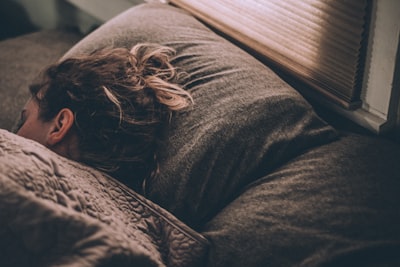
When used safely and under the guidance of healthcare professionals, medications for insomnia can be very helpful. These medications can quickly help with chronic insomnia and problems like trouble falling asleep or staying asleep.
Using these medications means taking them for a short time. This helps lower the risk of needing them too much and helps improve sleep quality. Healthcare providers are important in giving the right doses and making sure people stick to the treatment for the best results.
For many users, sleep medications can be safe and work well when combined with behavioral therapy or changes in lifestyle. Better sleep can lead to improved daily performance and overall well-being.
Potential side effects and dependency issues
While sleep medications can work well, they also come with risks. These risks include dependency and withdrawal symptoms. Benzodiazepines and Z-drugs can cause serious side effects if not taken as directed. These can include loss of memory, hallucinations, and a higher chance of death.
When people use these medications repeatedly or at high doses, they may develop physical dependence. This makes it hard for them to stop using the medication. Without proper supervision, they might face withdrawal symptoms like sweating, nausea, or trouble sleeping.
Doctors suggest that these medications should be used for a limited time. They also recommend alternatives like cognitive behavioral therapy to help reduce concerns about dependency and to treat insomnia in a healthier way.
Conclusion
In conclusion, it is important to understand and choose the right medications for better sleep. This guide has shared different options, such as natural supplements like melatonin and prescription medications like zolpidem and lemborexant. We talked about their benefits and risks. When picking a sleep aid, think about your own needs and the potential side effects. Always talk to a healthcare professional before starting any medication. This will help make sure it fits with your health goals. If you have sleep issues or need personal advice, feel free to reach out to our experts for a free consultation. Your way to better sleep can start with informed choices!
Frequently Asked Questions
What are the safest sleep medications to use long-term?
Medications such as ramelteon and some low-dose treatments have fewer side effects. They are safer for long-term use if a healthcare provider supervises them. For chronic insomnia, it is important to consider non-medical ways, like cognitive behavioral therapy. These methods can help improve sleep quality without causing dependency.
https://www.qxmd.com/r/12849238
https://www.qxmd.com/r/10394611
https://doi.org/10.4088/pcc.v03n0303
https://order.store.mayoclinic.com/flex/mmv/SLEEP01
https://order.store.mayoclinic.com/flex/mmv/incon01
https://www.fda.gov/consumers/consumer-updates/taking-z-drugs-insomnia-know-risks
